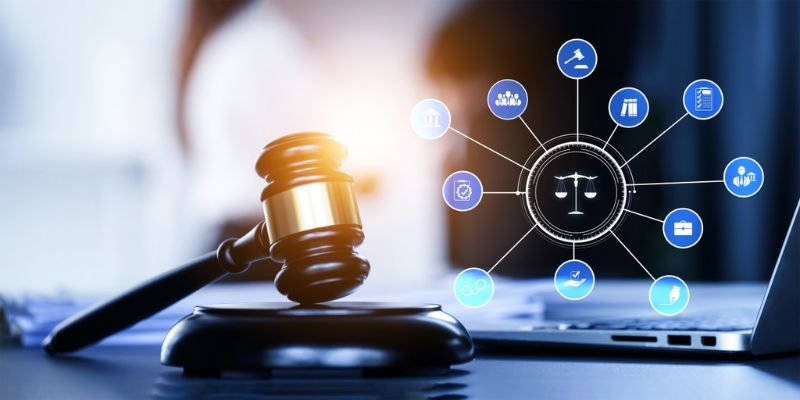Navigating the Net: How Governments Can Smartly Regulate Digital Platforms
As we plunge deeper into the digital age, the big question emerges: How can governments effectively regulate digital platforms? It’s a tricky path to tread, where stepping too hard can stifle innovation, while too light a touch could leave consumers out in the cold. Get ready to dive into the nitty-gritty of setting rules that foster fair play in the online arena, shield our rights as users, and keep the tech titans in check. From redefining legal borders to enforcing fair competition, we’ll unpack how smart frameworks can balance the scales. We’re tackling a mission to keep the internet open yet orderly, driving tech firms to do better while letting new ideas soar. Join the journey to unveil a future where screen time means safe time, and the digital ecosystem thrives, regulated just right.
Establishing the Groundwork for Digital Platform Regulation
Crafting Legal Frameworks for Online Marketplaces and Social Media
Laws for internet companies are like rules for a game. They help keep it fair. They need to protect us, the players, but also let new ideas grow. For regulating online marketplaces and social media, it’s like walking a tightrope. One side falls to stifle new stuff, the other to harm from too loose rules.
Online shops and chat sites need laws that are clear. Think of it like setting up fence posts to keep the area safe for everyone playing inside. These laws make sure giant techs don’t push out small guys, giving everyone a chance.
Take the GDPR, rules that keep our secrets on the net safe. They show how good laws for the web can work. They keep our info locked tight but let shops and social sites keep showing us new things.
The Balance Between Innovation and Regulation in Technology Legislation
Finding a sweet spot is key. Too many rules can choke innovation, but too few can let big techs run wild. Think of a garden. If we let it grow free, weeds might choke the flowers. But if we cut it back too much, nothing will grow. Laws should work the same for tech stuff.
We need laws that let new ideas bloom but pull out weeds like unfair play and stealing secrets. These laws should help us, encourage new tricks, and keep bad moves in check. Laws must change as tech does, never stuck.
Every step needs thought about how it hits folks like you and me. Too strict could kill cool new tools we might love. Too loose could let harm come through our screens. This balance is a must.
Crafting the right rules for tech is like making a meal. Every spice counts, from taxing big digital shops to keeping our talks private. Mix it up well, and we could all enjoy the feast. Mess it up, and no one’s happy.
Keeping an eye on the big picture matters too. Our net is worldwide. So we should think about how our rules play with others’. It’s like knowing the rules of a game everyone’s in.
Words I’m throwing here are easy, but the work’s not. It’s big stuff. It keeps our online life fair and fun. With every law, we’re building a better game for all to play. It’s a puzzle, but one worth solving. Let’s keep the game going strong.

Enforcing Fair Competition and Protecting Consumer Rights
Tackling Monopolistic Practices with Antitrust Measures
Think about a game where one player makes all the rules. It’s not fair, right? Well, some big tech firms do this in the digital world. They control too much. To stop this, we use antitrust measures. These laws keep one company from owning it all. Simply put, they make the playing field level for all players. When there is fair play, consumers win. They get more choices and better prices.
But how do we use these laws? One way is to stop big deals that would give a company too much power. For example, we stop them from buying a smaller rival that could be a threat later. We also use these laws to break up companies that are too big. This makes sure no one holds all the cards.
Antitrust measures need to be smart, though. They must stop unfair control without hurting the good things that big firms can do. Like making new tech for us to use. So, our aim is to find the sweet spot. We want healthy competition that brings new products and ideas to life.
Ensuring Platform Neutrality and User Privacy Safeguards
Now, let’s talk about platform neutrality. This means digital platforms must treat all content equally. No favorites. Platforms shouldn’t pick winners and losers. It’s like a referee in a sport, who must be fair to all teams.
Protecting user info is also key. We all want our secrets safe, right? New rules must protect privacy and give users control over their data. Big tech companies hold a lot of our data. The rules make sure they keep it safe and don’t misuse it.
One way we do this is by pushing for laws that watch over how they collect and use our data. It’s about making sure they play by the rules and don’t take shortcuts that could hurt us.
At the same time, we must allow the digital world to grow. We shouldn’t make rules that hold back clever new ideas. The goal is to keep users safe and let the digital world be a place where cool, new things can happen.
In short, rules should be fair and keep everyone safe. By using these rules, we help keep the power spread out. And we ensure that users, like you and me, keep our rights and our data safe. When we do this right, everyone gets a fair chance, and the digital world stays an exciting place to be.

Advancing Transparency and Ethical Standards
Algorithmic Decision Making and the Role of AI Ethics
Let’s talk about how governments can make digital platforms show us how they work. This is about being open, or what we call transparency. We use big online places every day, like social media and shopping sites. These places use special computer programs, called algorithms, to decide what we see. Sometimes, these algorithms can make mistakes or not be fair. That’s why it’s important that the smart folks who make these programs follow good rules, known as AI ethics.
Now, you might wonder: “What are AI ethics?” AI ethics are like a list of dos and don’ts for creating smart computer programs. They help make sure that the programs do good things and not bad ones. For example, when a smart program decides who gets a job or a loan, it should not be unfair to anyone because of how they look or where they come from.
But right now, government rules aren’t strong enough. They need to make better laws for when these smart programs mess up or hurt someone. These new rules should make sure that everyone knows how decisions are made. They should also make sure that if someone is hurt by a computer’s choice, they can find someone to help them fix it.
Besides, governments can teach people about how these computer decisions are made. This helps everyone know more about the smart programs they use every day. By understanding how these things work, we can all ask for better and fairer rules.
Protecting Users from Misinformation and Ensuring Content Moderation
Next up, let’s talk about how governments can protect us from false stories online. Sadly, there’s a lot of untrue stuff on the internet that can trick people and cause harm. This is called misinformation. It’s a big problem, and it can make people think or do the wrong things. That’s why we need good content moderation laws. These laws help tell which stories are true and which are not.
What do we mean by content moderation? Imagine you have a big wall where anyone can draw or write messages. Content moderation is like having a friend with an eraser who checks the wall. If there’s something mean or not true, they erase it. Online, content moderation works kind of the same way.
Governments have to decide what should stay and what should go. But it’s tricky. They don’t want to erase too much because people should be able to talk freely. It’s about finding the right balance.
Governments need ways to check quickly if a story is true. They also have to make sure that the big online places don’t just watch themselves. We need outside people to check their work, making sure everything’s done right.
For sure, this isn’t easy. But when we get it right, we all feel safer online. We know that what we read and share is likely true. That lets us trust the big online places more. That’s good for everyone – for you, me, and the whole online world.

Building an International Consensus on Tech Regulation
Navigating Cross-Border Data Flows and GDPR Implications
Cross-border data flow is moving info across countries’ lines. The GDPR, or General Data Protection Regulation, sets rules for this in Europe. It impacts firms worldwide. Why? Because it applies to any business dealing with EU citizens’ data, no matter where the company is based. Leaders have to ensure firms follow these rules to protect people’s info.
Now, let’s dive deeper. The GDPR guards personal data and gives folks rights over their info. It requires companies to get consent to collect and use data. Firms also must report data breaches fast and let people access or delete their data. This means strict checks on how data moves around the globe. So, leaders set up deals to let data cross borders smoothly while still keeping privacy in check.
That’s not all. Workers in digital firms need to understand these laws. They also must know what data they can share and how to keep it safe. This is where educating workers and setting firm policies comes in. That way, everything stays within the law. Indeed, managing data well helps build trust with users and other countries.
Fostering Global Cooperation in Digital Governance and Surveillance Limits
For global digital governance, countries work together. They create rules that all follow. The goal is to manage digital spaces, so they’re fair and safe for everyone. This calls for a mix of teamwork and standing firm on key values like privacy and human rights.
Now let’s unpack that. Strong international ties can stamp out nasty digital deeds like fraud and abuse. But there’s a thin line with surveillance limits. Too much watching can harm privacy and freedom. So, governments work out how to keep an eye on things while still respecting rights. They create laws that stop unwanted snooping. They also set up systems where countries can ask for help to get data, if needed, while still following human rights.
All this talk on cooperation leads to an important point. Uniting different countries with varied laws is tough. But when done right, it can stop big tech from having too much control. Plus, it can protect user privacy across different lands.
Together, we see a complex but crucial task. Leaders must weave together many threads—laws, user rights, tech needs—to regulate digital spaces well. It helps us all—people, companies, and countries. That’s what smart digital platform regulation is all about: finding balance, protecting rights, and keeping the digital world a fair place to be.
In this post, we dug into how to manage tech platforms better. We looked at making rules for online places and social media. It’s key to keep tech growing but also in check. We talked about how to stop big companies from blocking others and how to keep your data safe. We need clear laws so that tech companies play fair.
We also chatted about keeping things open and honest, especially with how AI works. It’s important to protect you from fake news and be sure the right posts are checked. Lastly, we can’t go it alone. We need to work with other countries on data and watch over tech together.
Here’s the bottom line: we need strong, clear rules for the tech world. This keeps your rights safe and lets good ideas thrive. Let’s make tech trustworthy and good for all.
Q&A :
How do governments currently regulate digital platforms?
Governments around the world have implemented various measures to regulate digital platforms, including enacting laws focused on data protection, privacy, and consumer rights. For instance, the General Data Protection Regulation (GDPR) in the European Union sets stringent rules for data handling. In the United States, Section 230 of the Communications Decency Act plays a key role in governing how internet companies manage user-generated content. Antitrust laws are also used to address issues of market dominance and unfair competition.
What are the challenges in regulating international digital platforms?
Regulating international digital platforms presents numerous challenges due to differing laws across jurisdictions, the borderless nature of the internet, and the rapid pace of technological innovation. Balancing regulation with the freedom of expression, protecting consumer data without stifling innovation, and enforcing local laws on global platforms are among the key difficulties that governments face.
Can government regulations keep up with the rapid growth of digital platforms?
Keeping regulations up-to-date with the swift evolution of digital platforms is a significant challenge for governments. To stay current, legislation needs to be flexible and adaptable. Ongoing collaboration between policymakers, tech companies, and industry experts, along with a commitment to revising and updating laws regularly, is essential to ensure regulations remain effective and relevant.
What measures are being proposed to improve regulation of digital platforms?
Numerous proposals aim to enhance the regulation of digital platforms, including updating current privacy and data protection laws, creating new frameworks for competition and antitrust regulations, and establishing clearer standards and guidelines for content moderation. Policymakers are also considering the introduction of digital taxes and more rigorous accountability measures for tech companies concerning illegal or harmful content on their platforms.
How do regulations impact the innovation and growth of digital platforms?
Regulations can have a double-edged impact on digital platforms. On one side, they can provide a structure that fosters fair competition, protects consumers, and upholds societal values, thereby nurturing public trust and stable growth. However, overly stringent or outdated regulations can stifle innovation, limit the entry of new players, and inhibit the overall dynamic nature of the tech industry. Hence, achieving the right balance is critical for the sustainable development of digital ecosystems.

